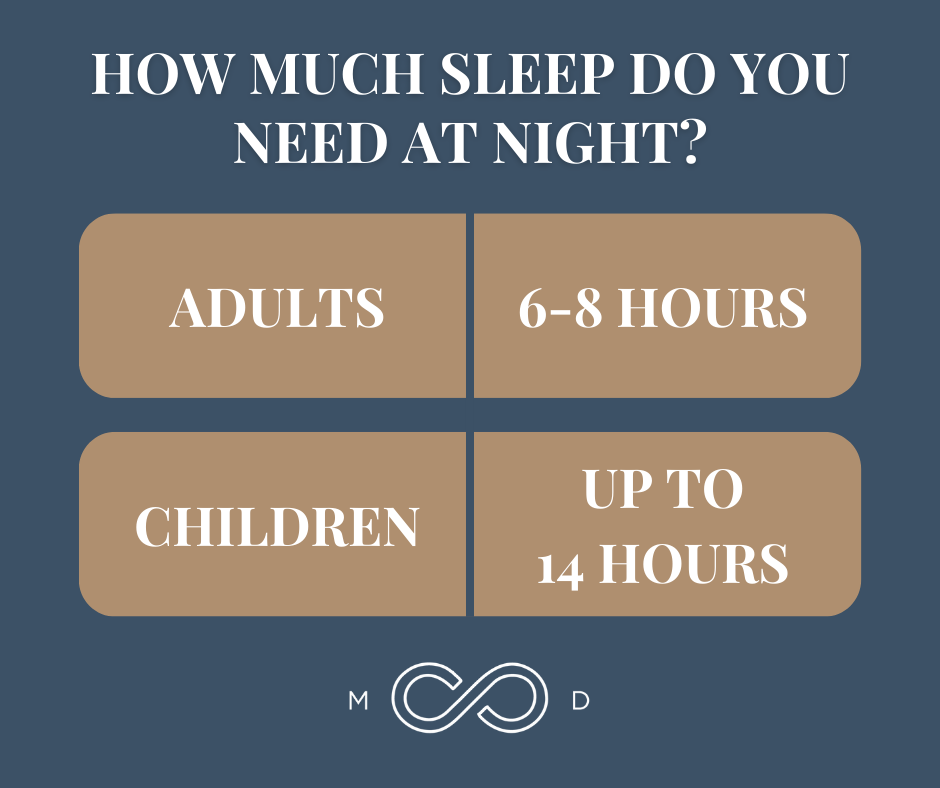Download file | Play in new window | |
Here at Brentwood MD, we believe nearly all meaningful progress in your health journey maps disproportionally through three major pillars:
- How you feed your body
- How you move your body
- How you recover your body
We’ve already talked about feeding your body and moving and challenging your body physically. Here, we’re digging into the third and final section of this series: recovering your body. We’ll do it in three layers:
- How we need to think about recovery
- How we physically experience recovery
- How recovery (or lack thereof) affects us emotionally
To really make significant progress in optimizing our health, we have to learn to recover better. And by that, I mean we need to learn to sleep better, because the most important aspect of recovery in the human experience is sleep.
To be clear, this post isn’t an instruction manual on how to sleep better, though we’ve covered some best practices for sleep improvement in the past. This post is a look at sleep as the number one contributor to an optimal health journey, and why we may have been thinking about it all wrong for too long.
Layer 1: How to Think About Recovering Your Body
Recovering your body is one of the most important things you can do for longevity and performance. While this post focuses on sleep, there are actually two categories of recovery:
- Active recovery
- Passive recovery
Active recovery refers to the days in between your more intense workouts in which you stick to lighter physical activity, like walking, yoga, or just the activities of daily living. You’re still in motion, but your muscles and body have a chance to recover from the more strenuous work you’ve put them through.
Passive recovery can refer to rest due to an injury. If you have a brand new high-ankle sprain, you don’t need to go for a walk on it. You need to rest it. Outside of acute injury, though, passive recovery refers to sleep.
At this point, society has somewhat come around to the idea that sleep is a significant player in human health. I’d argue, though, that we need to elevate sleep in our thinking higher still, to essential wellness component #1.
DOWNLOAD OUR FREE EBOOK
Concierge Medicine is the future of healthcare.
Learn more about this refreshing alternative to traditional primary care, and decide if it's right for you.
Key Considerations to decide...
Is Concierge Medicine Right for You?
Why? Just take a look at the math.
If you sleep between six and eight hours per day, that’s a full third of your life — an average of about 230,000 hours. And that’s just adult sleeping hours; as children, we needed up to 14 hours a day.
What other thing do we do that takes up a third of our lives? We eat in moments. We train in moments. But sleep? We may have off nights every now and again, but for the most part, we must sleep for six to eight hours every single night.
If we need that much sleep for our human existence, how can optimizing our quality and quantity of sleep not be the most significant improvement in our health journey?
It’s time we started thinking about sleep as the most important thing.
Give Sleep Its Due
Our society as a whole is very busy. People are busy building businesses, attending meetings, taking the kids to practice, and on and on. These are the things that bring success, so these are the things we prioritize and build boundaries around.
But if sleep is the most important component of our health, then success in this area is crucial, too. What would happen if we put as much emphasis, time, and effort into our sleep as we do our careers, our marriages, our finances, or anything else that’s vitally important to us?
Whatever we pay attention to tends to grow and improve. And just as in all those other areas of life, appropriate attention and boundaries around sleep are the root of success.
When we look at any successful person in any successful area of their life, and we really get under the hood, we find a rhythm of boundaries and rules. They may be so organic that the person doesn’t consciously think about them anymore.
It’s like a beautiful golf swing. You don’t think about it. It’s just there, in your nervous system. But it’s infinitely complex — a result of attention and boundaries that honed your movement into an effective and automatic motion out on the golf course.
Sleep is similar, only it doesn’t often get the same level of attention. The consequence is a lack of adequate boundaries and rules of engagement, which means your behaviors and rhythms don’t yield optimal sleep.
We need to start thinking about sleep as something to guard, as much as we guard other important aspects of our life. Maybe that means no phone calls after 9 p.m. Maybe it means no work after 6. The specifics are up to you and what makes sense for your life. The crucial, universal point is to give sleep the attention and boundaries it deserves.
Layer 2: The Experience of Sleep
We’ve been trained into a poor consideration of sleep from our youth.
It starts really early: You have baseball practice? No problem, you’ll just have a late night. Or, you have some extra homework — late night. Or, youth group — late night. Or, a big project. A trip. Monday Night Football. Netflix.
From our earliest years, we learn this mantra: When in doubt, cut sleep.
It’s the same in grade school, college, our careers, and every step along our development from children into adulthood. Do the best you can, but if you don’t have enough time, don’t cut the behaviors or activities; cut sleep.
Why? Because we have tools and chemicals to temporarily compensate for a lack of sleep during the day. But these come with problems of their own.
Every time you bring in a compensatory mechanism, you need an additional compensatory mechanism on top of it.
You drink caffeine to power through the day, but then you can’t sleep at night. Maybe you need alcohol to wind down, or sleeping pills to get and stay asleep. And then, of course, you need caffeine again the next day. It’s a vicious cycle.
How much of this stems from an inaccurate ability to audit our lives for the busyness we’ve been trained to sustain?
Many of the elements that make up our life’s busyness are good; there’s nothing wrong with them. But are they essential? We have to find somewhere to start trimming so we can appropriately allocate attention and boundaries to the things that really are essential — like sleep.
In my experience, unless you’ve mastered sleep, you’re likely feeling the effects of chronic fatigue every single day. In fact, sufficient sleep is so foreign to so many people that they don’t remember what it feels like to be rested.
This is especially common among high achievers. It takes a lot of time and energy to get to the top of the class, or the sales charts, or the business ladder. Even among physicians, medical school and residency train us to sacrifice sleep on the altar of 24-hour (or longer) shifts. Our society vigorously encourages — perhaps unintentionally — achievement over sleep.
So if prep for an important test, presentation, or board meeting bumps up against sleep, there’s been no question which one is going to give.
Know the Value of Sleep
The benefits of our daily activities are easy to see and quantify. The benefits of sleep, less so. We know it’s important, but missing a little here and a little there — repeatedly and over time — doesn’t have such obvious, in-your-face effects as something like missing a deadline at work.
It’s difficult to really pursue and invest in something if you don’t know its value, which is why we’re highlighting sleep — and the consequences of missing it — here.
Besides leading to dependence on compensatory mechanisms to get through the day, missing sleep actually becomes dangerous over time. We see it manifest physically as high blood pressure, overeating, weight gain, poor impulse control, elevated heart rate, and more.
Regularly missing sleep isn’t just an inconvenience or a harmless shortcut on the road to success. Eventually, it produces disease.
Layer 3: Sleep and Your Emotions
Most of us are a little more familiar with the emotional toll of missing sleep than with the serious physical issues. Even one night of troubled sleep can cause:
- Irritability
- Frustration
- Overwhelm
- Anxiety
- Depressed mood
And while one night of poor sleep creates a negative emotional impact throughout the day, the problem compounds with chronic sleep loss. You end up slogging through the week, living for the weekends, and spending all day Sunday dreading getting back to the grind.
It’s an incredibly negative cycle that erodes your inhibition control and leads to self-soothing decisions in other areas, like diet and alcohol. An inability to cope well with normal life situations develops, and you no longer have that tailwind, that energy you need to put toward daily problem-solving.
And, of course, chronic trouble getting to sleep creates anxiety every bedtime, which worsens the problem.
Succeed in Sleep Over Time
Often, the more successful a person is, the more they struggle with sleep. And it’s frustrating. Why can’t I figure this out? I solve problems for a living! But this is one problem that thinking and pondering alone can’t solve.
Improving sleep takes building new rhythms and behavior modification. It requires assessing, measuring, and changing the cycle you’re caught up in. And it doesn’t all happen at once.
To optimize this crucial area of health, you first have to accept that you aren’t going to undo decades of suboptimal practice in a few days, or perhaps even a few months. It’s just too complex, too multifactorial an issue.
Instead, you can begin to hunt down the problems. What’s causing you to miss sleep? What’s hurting your quality of sleep? What are some adjustments you can experimentally make that might help? Then, evaluate the results and move forward.
Incremental improvements on something you do every single day end up being a massive area under the curve over time. A 2% improvement in sleep every night, 365 days a year, is an enormous improvement of net recovery overall.
Remember: progress over perfection. Any incremental improvement you can make in something as significant asleep — which you do every single day you’re on the planet — will yield massive returns.
Final Thoughts
We need to elevate sleep to the level it deserves in our thoughts, priorities, and discussions about health. I hope we can have more honest conversations about how we prioritize it in our society and in our individual lives.
Then, perhaps people could begin to consider ways they can cut inessential busyness and build rhythms, behaviors, and boundaries that support an optimal sleep experience.
Sleep more. Sleep better. It will take some time, change, and honest reflection to improve, but as the biggest key to your health and longevity, it’s a worthwhile investment.

Dr. Aaron Wenzel is a concierge physician specializing in the care of fast-moving entrepreneurs, executives, and public figures in the Nashville, TN area. Dr. Wenzel’s diverse life experience and extensive training in family medicine, emergency care, nutrition, and hormone replacement therapies give him the unique platform to provide unmatched care for his patients.









